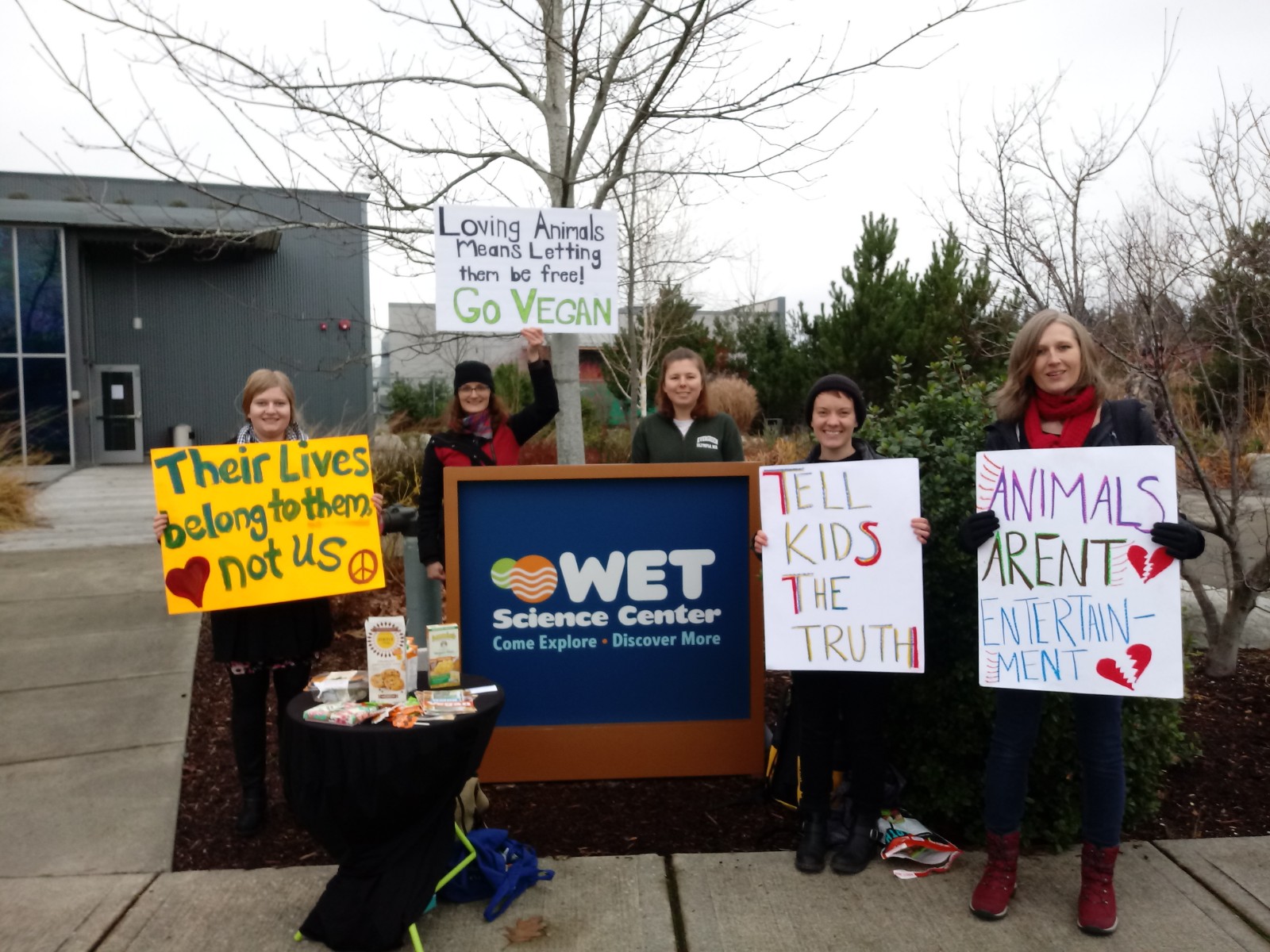At a recent showing of live animals by the Reptile Zoo, local animal rights activists “came together from different pockets of the community to protest zoos and the lies they spread to children” according to Sady Sparks who coordinated the protest. Sparks co-runs The Evergreen Vegan Club at TESC and organizes a variety of animal rights activities in the community.
…the Reptile Zoo is a for-profit business, not a sanctuary or rescue operation that offers refuge or a natural, healthy environment for animals |
The Reptile Zoo has a facility in Monroe, Washington, and also tours a show of eight to twelve reptiles, including turtles, snakes, small alligators, and other species. Presenters give information about the animals for about 40 minutes, after which community members are allowed to pet and handle the non-venomous species for approximately 15 minutes.
Reptile Zoo claims contradicted by treatment of animals
As animal rights activists looked on, about 30 community members entered the Wet Science Center to watch and participate in the reptile show. Activists greeted families as they passed, discouraged them from entering the show, and offered up vegan cookies and outreach materials.
The Reptile Zoo claims to have a mission of educating the public about wildlife conservation and respect for animals. However, the Reptile Zoo is a for-profit business, not a sanctuary or rescue operation that offers refuge or a natural, healthy environment for animals that are abused, neglected, or whose habitat has been destroyed. The Reptile Zoo confines animals in small plastic tubs for many hours per day, during transportation and while waiting to be shown. The animals are often taken to multiple shows per day, where they are repeatedly handled by hundreds of children and adults at schools and other venues.
Preparing animals to entertain humans alters them
Community members are kept away from the show’s featured animal, a king cobra, as well as other venomous species. Only Reptile Zoo staff are allowed to handle these more dangerous animals. In order to make it possible to handle venomous snakes at all, the animals are put through surgery to remove or disconnect their venom glands.
The Reptile Zoo’s practice of using animals for entertainment, to the strong detriment of the well-being of the animals themselves, does not support its supposed “mission” of wildlife conservation and appreciation for animals. The Reptile Zoo’s cruel and counterproductive practices reinforce the attitude that animals exist for the use of humans, and sets a poor example for children to understand what respect for animals truly means.
Animals too have a right to be respected
From an animal rights perspective, the Reptile Zoo’s practices are clearly in violation of animals’ inherent value as sentient beings. Each animal’s life and well-being matters to that animal. Animals deserve, and have a right to, the fundamental respect of being free from exploitation by humans as the means to an end. Thus, they cannot be used, period—for food, clothing, entertainment, or any other purpose.
Sparks met with two environmental educators on staff at the Wet Science Center one week prior to the event. The educators declined to cancel hosting the Reptile Zoo, but did respectfully give an hour to hear the animal rights community’s perspective on zoos. They stated that the Center would take this perspective into serious consideration when planning future events.
Opportunities to support positive treatment of animals
Concern for animal rights is a burgeoning movement in Olympia. Local activists connect through social media, local events calendars and postings, and The Evergreen Vegan Club to organize protests, street outreach, and workshops. The next opportunity to meet local vegan activists and get involved is at an Introduction to Veganism workshop on Monday, February 4 from 5:30 to 7:30 at the Olympia Timberland Library. This workshop is the second in an ongoing series of free, once-per-month classes offered by local activists to educate and empower community members to become vegans.
If you and your family enjoy opportunities to see and learn about animals while creating a better world for them, there are places to visit like Pasado’s Safe Haven in Sultan, Washington or Pig’s Peace Sanctuary in Stanwood, Washington, with a strong track record for providing sanctuary to animals.
Heather Sundean lives in Tumwater and is a long-time vegan. She also helps with the WIP website.


Be First to Comment